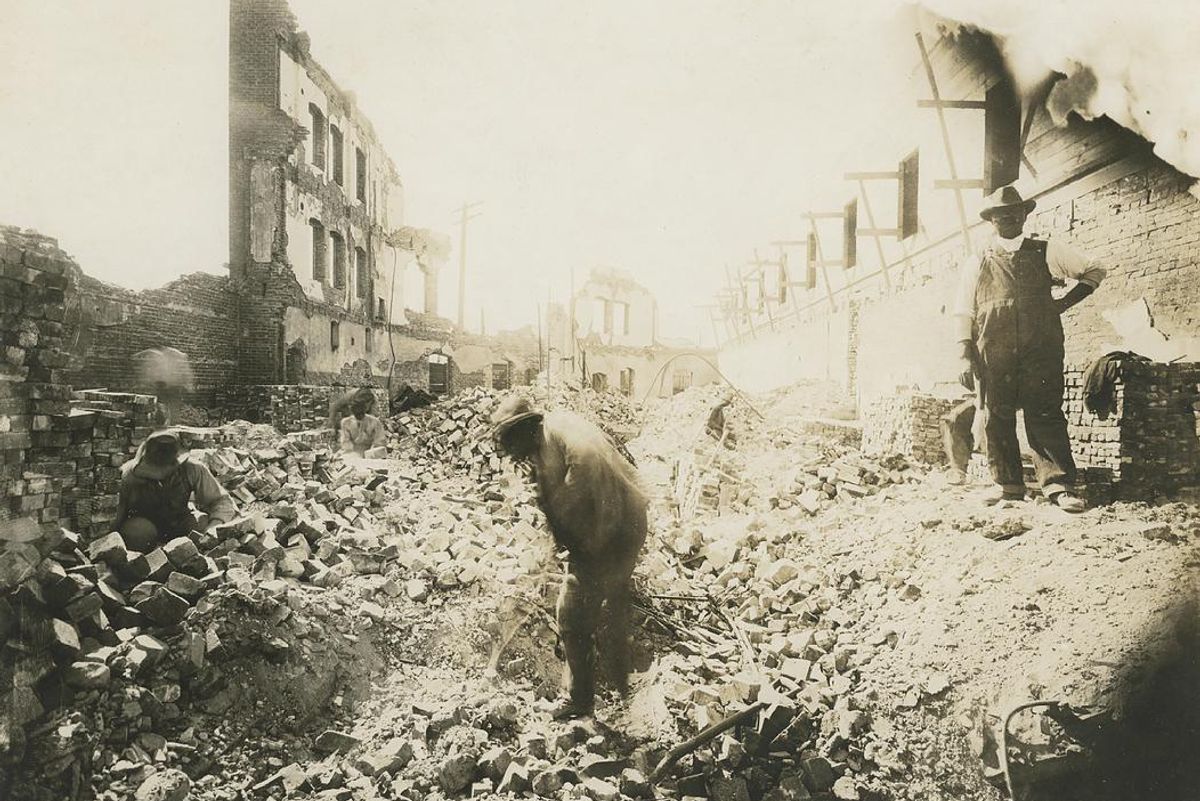
I learned about the Tulsa Massacre in graduate school and upon learning about it, I thought my previous education had failed me, but I learned it wasn’t just me. Turns out that most students didn’t learn about the history of Tulsa’s Black Wall Street and the atrocities that occurred to set the residents back. Surprisingly, even students in Oklahoma didn’t learn about what happened in the bustling, prosperous Black community in 1921. Just over 100 years ago, an angry white mob descended on Tulsa’s Greenwood District, the small Black community that had amassed wealth in the short 56 years following the Emancipation Proclamation being signed. The community was entirely self-sufficient with their own barber shop, bank, grocery store, newspaper and school. There were even doctors and real estate agents within the community, which allowed them to exist without the need to depend on others outside the community.
When the mob came to town, they burned the entire community to the ground and killed around 300 people, historians surmised. The city lay in ruins for years as the state focused on building up the more predominantly white areas and refused to allocate resources. Insurance companies refused to pay out claims to rebuild the once thriving community. Residents of Greenwood felt the effects of this for generations. Today there are three surviving members of Black Wall Street, Lessie Benningfield Randle, 107, Viola Fletcher, 107, and Hughes Van Ellis, 101 and a judge just ruled that their lawsuit seeking reparations can proceed.
This is a huge victory for the three surviving victims because not only will they see justice in their lifetime, it would finally be monetary recognition of the generational setbacks Black people endured. Reparations is always a prickly subject to delve into, but this is because we’ve been told our entire lives: if you want to make it in America, everyone has the same opportunity to pull themselves up by their bootstraps. As a result, people feel that descendants of the enslaved, including the last three Tulsa Massacre survivors, are getting something undeserved without work.
Congresswoman Sheila Jackson Lee is in Tulsa at the court house with Tulsa Greenwood Massacre survivors, all of whom are over 100 years old, to seek reparative justice. The House Judiciary Committee held a hearing on this very legal theory.pic.twitter.com/h3XEul2GST— Sheila Jackson Lee (@Sheila Jackson Lee)
1651526127
Reparations is something that was promised from the beginning to help level the playing field a bit and if you’re living in this market you know that property is an investment and a way to create generational wealth. Enslaved African Americans were promised up to 40 acres of land per family upon being freed but the land was ordered to be returned by Andrew Johnson, Lincoln’s successor. Returning the land allowed white citizens and slave owners the ability to continue to create generational wealth, the effects of which can still be felt today. There have been other instances that play into the racial wealth gap in America like redlining, Jim Crow, mass incarceration, etc., so the possibility of at least the survivors getting reparations is a reason to celebrate.
If the three elderly Tulsa Massacre survivors win their case, it will not only provide reparations for them, but for their descendants as well. Civil rights attorney Damario Solomon-Simmons told the Associated Press, “We want them to see justice in their lifetime,” he said, choking back tears. “I’ve seen so many survivors die in my 20-plus years working on this issue. I just don’t want to see the last three die without justice. That’s why the time is of the essence.”
The court room was packed and cheers echoed in the chambers when the judge ruled the case could move forward. Winning this case would not only be justice for the survivors but a positive moment in history to witness.
